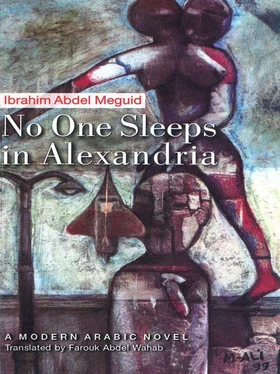Everyone laughed, then Camilla shouted “Amm Mahmud!” “Again, even in Ramadan?” Lula said.
Amm Mahmud’s voice rang out from the street, “Latest! Latest! Read all about it!” Camilla took half a piaster from her mother and went out quickly. Yvonne explained to Zahra that Amm Mahmud came around whenever an extraordinary event took place, selling a printed sheet with the details of the incident before the newspapers published it. Zahra made the gesture of warding off evil by pretending to spit down the front of her gallabiya and said, “God protect us!”
Camilla came in silently.
“Read it,” her mother said, smiling.
“It would be better if Yvonne read it,” Camilla answered.
Yvonne held the printed sheet and read silently, then blushed and said with affected nonchalance, “It’s nothing. A lady’s married to two men at the same time.” Lula hit herself on the chest in fear and made the same gesture to ward off evil more than once.
“Tear up the sheet and throw it in the garbage,” was Sitt Maryam’s calm reaction.

Magd al-Din noticed that there were many children who had gone out in the street despite the dark and the absence of streetlights. He walked with Khawaga Dimitri in the other direction toward Karmuz.
“A plague on England and Germany on the same day,” said Khawaga Dimitri. “We get nothing out of it but inflation and darkness.”
The stores were open, doing business by the light of candles or small kerosene lamps. Some owners were bold enough to turn on one or more electric bulbs, but the lights were all inside. What little light escaped outside enabled the children to play and the passers-by to walk. Most people came out to buy food for suhur, the late-night meal of Ramadan, and for the following day. Magd al-Din saw a European-style bakery and thought of buying some bread, but Dimitri told him that the bakery stayed open all night long; they could buy the bread on their way back. For now they should go first to Karmuz Bridge to buy tobacco.
Immediately after the bridge was a store with a white facade and windows of shining glass. The light came from a small white lamp. The salesman had a white, ruddy face and wore a white coat. Magd al-Din noticed that the store carried many brands of cigarettes, molasses-cured tobacco for the narghile, and regular bulk tobacco. Dimitri bought tobacco for a piaster and remarked, “Fresh Turkish tobacco with a refreshing taste.”
Magd al-Din bought the same and decided he would be a regular customer at the store, since bulk tobacco was better than that in packets.
On their way back, Magd al-Din looked from the bridge to the Mahmudiya canal, now dark on both banks. He saw many barges and ships moored there. He realized that there would be many work opportunities for the unemployed the following day. In Ban Street the kids had lit their lanterns in disregard of civil defense instructions and went door to door asking for the customary treats, or sat in small groups chatting and playing. Dimitri did not wish to go back so soon and suggested to Magd al-Din, “How about a cup of coffee? This would give the women the chance to stay up.”
Magd al-Din thought it would be a good opportunity for Zahra to overcome her sorrow. He went into the cafe adjacent to Gazar Pastry Shop. It was filled with patrons drinking tea and coffee and playing backgammon, dominos, and cards by the light of small lamps. Dimyan was playing dominos with another person, while three other men sat with them. As soon as Dimyan saw Magd al-Din and Dimitri he got up to welcome them. Magd al-Din said, “You’re staying up too, Dimyan?”
“Ramadan encourages one to stay up, Sheikh Magd!” was his reply.
As they all sat down, Dimyan shouted, “As of tomorrow, with the beginning of the month of Ramadan, the people’s restaurants will open their doors to the poor to break their fast. That’s the king’s order. So the poor can be guaranteed to eat for a month. Long live the king and long live Ali Mahir too! “
A man sitting in the far corner added his own dedication: “And long live the singer Muhammad Abd al-Muttalib and Sitt Fathiya Ahmad!”

The advent of the month of Ramadan did not cause the Egyptian government to relax the emergency and civil defense measures. On the contrary, they were tightened. Alexandria, like other municipalities, instituted nighttime and daytime air-raid drills. The prices of some commodities, especially fuels such as kerosene, gasoline, and natural gas, were raised. Some commodities, such as cooking oil, were removed from price-control lists, and people complained loudly. Flour mills began to add more than the legal limit of corn meal to wheat flour. As a result of the strict enforcement of civil defense regulations, no permits were issued for the erection of the tents or temporary pavilions for entertainment or religious events that people were used to having in the squares, outside the mosques, or other such places during Ramadan. For city dwellers, this year’s Ramadan was less cheerful than usual.
In the big world outside, the naval war was still raging. The exploits of the legendary German battle cruisers Scharnhorst and Gneisenau, which attacked British convoys, filled the world. The two battle cruisers seemed like ghosts; no one knew when they would appear, and after they had struck, they disappeared in the deep waters of the Atlantic. And so did the two pocket battleships Admiral Graf Spee and Deutschland. During reconnaissance flights, the Luftwaffe launched the first raid over France. French fighter planes chased and shot down some of the German planes. That new development caught the world’s attention; German planes were now capable of going beyond Alsace-Lorraine. Fears increased when German deployments extended from the French to the Dutch borders. The Germans said the French borders were too narrow and that they needed to reinforce their troops. They also said Germany had no designs on the Netherlands. Jaffa oranges appeared in the markets in Alexandria. It was said that the abundant crop in Palestine could not be exported to Europe because of the war, and that was why the fruit was so cheap.
His Majesty King Farouk bestowed the rank of general on His Excellency Baker Pasha, Alexandria’s police superinten-dent. People were cautioned against going beyond the streetcar route in the suburb of Sidi Bishr at night; there had been many murders, strong-arm robberies, and rapes. For the first time, it was decided that army officers would travel on the railroads first class, in recognition of their prominent place in society and to safeguard their dignity. His Royal Highness Prince Muhammad Ali left Alexandria for Cairo at the end of the summer season. The Teatro of Biba Izz al-Din performed the vaudeville play An Aristocratic Thief. The Egyptian gold pound coin was worth 185 piasters, and Craven cigarettes were three piasters for ten and six for a twenty-cigarette pack. It was decided that the officers of the Territorial Army should be recruited from the ranks of physical education graduates, who were always unemployed. The Egyptian film Determination was screened for the first time. The US Neutrality Act, also known as ‘cash-and-carry,’ was passed, removing the ban on arms exports to the Allies. Three German soldiers who had murdered General von Fritsch during the fighting near Warsaw were executed. The king continued to perform the Friday prayers at a different mosque every week; so far, he had prayed at the Kikhya mosque in Cairo and al-Dikhayla in Alexandria. The public safety report was issued, stating that fires had destroyed 858 houses, causing five thousand Egyptian pounds worth of damage. The Border Guard Corps began training on the use of anti-aircraft artillery in Marsa Matruh. Colonel Ali al-Sharif Bey was appointed director-general of the border adminis-tration.
Читать дальше













